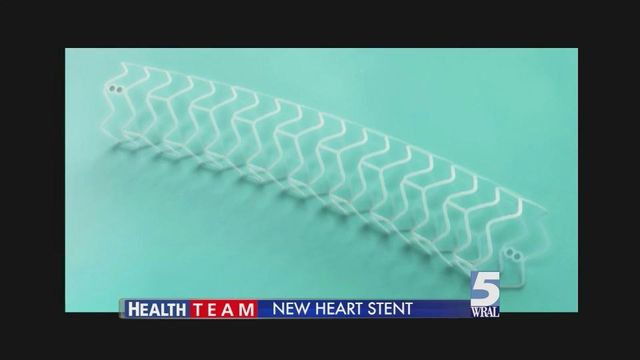Rex Hospital among trial sites for breakthrough dissolving heart stents
While metal stents remain forever, a newly approved stent is designed to dissolve when it's no longer needed.
Posted — UpdatedOne of the greatest advances in heart medicine over the last couple of decades is the stent.
Paired with balloon angioplasty, tiny metal stents open blocked arteries after a heart attack.
While the metal stents remain forever, a newly approved stent is designed to dissolve when it's no longer needed.
Heart attacks occur when narrowing of a heart artery eventually blocks oxygen-rich blood from reaching heart muscle tissue.
In many cases, interventional cardiologists can send a catheter to the blockage, expand the artery with a balloon and leave a tiny steel mesh stent to keep the vessel from collapsing, ultimately restoring blood flow.
"The long term downside is that you're still left with a permanent metal implant in a moving flexible artery," said Dr. James Zidar, a Rex Hospital cardiologist.
Zidar is starting to use the latest in heart stents, made from a more flexible polymer, called Abbott Absorb GTI. Rex was a trial site for the device, which received FDA approval on July 5.
The new stent is designed to slowly dissolve. After it's implanted, images can show the stent's structure supporting the inside of the artery.
"And over year one to three, the polymer goes away and you're left with nothing but the native artery," Zidar said. "Leaves sort of a golden tube and we've been able to follow this now in some of the trials for five years, and it seems quite stable."
Zidar says if there is future narrowing of the artery, all indications show it does not occur in the same area.
"And this also has the potential, not just in the heart, but in some of the small vessels in the legs below the knees," Zidar said.
Rex Hospital, with North Carolina Heart and Vascular, was one of three trial sites in the state for the device.
They enrolled the second most of participants of any other trial in the country. They also hope to be a place where interventional cardiologists from around the country come to learn how to implant these new polymer stents.
Use of the new stents will be rolled out slowly around the country because of the training physicians will have to undergo to get comfortable using these stents. The more likely places to receive them at first are at centers where the trials took place, such as Rex.
Zidar says these polymer stents have the greatest benefit for younger heart patients, typically between the ages of 45 to 65 who have blockage in the front wall artery.
If they develop problems in the future, a metal stent won't be in the way of having heart bypass surgery.
• Credits
Copyright 2024 by Capitol Broadcasting Company. All rights reserved. This material may not be published, broadcast, rewritten or redistributed.





